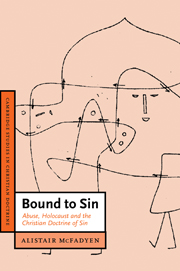Book contents
- Frontmatter
- Contents
- Acknowledgments
- Part I Drawing into Conversation
- 1 The loss of God: pragmatic atheism and the language of sin
- 2 Speaking morally? The case of original sin
- 3 Testing, testing: theology in concrete conversation
- Part II Concrete Pathologies
- Part III Testing the Inheritence
- Index of names
- Index of subjects
2 - Speaking morally? The case of original sin
Published online by Cambridge University Press: 02 December 2009
- Frontmatter
- Contents
- Acknowledgments
- Part I Drawing into Conversation
- 1 The loss of God: pragmatic atheism and the language of sin
- 2 Speaking morally? The case of original sin
- 3 Testing, testing: theology in concrete conversation
- Part II Concrete Pathologies
- Part III Testing the Inheritence
- Index of names
- Index of subjects
Summary
In the previous chapter, I discussed a major source of formal resistance to sin-talk, which applies to theological discourse more generally, as a means for clarifying both the nature of sin-talk itself and what might be involved in testing its explanatory and descriptive power. In this chapter, I continue the process of elucidating the intrinsic nature of sin-talk by exploring some of the points of resistance to it. Here I am concerned with substantive objections to the conceptual content of the language of sin, beyond the more general problematisation of God-talk in a secularised culture discussed in the previous chapter. These come into sharpest focus (and so may be more clearly identified) in relation to the understanding of sin found most abhorrent when judged by non-theological standards: the doctrine of original sin in its traditional formulation. Modern critique and resistance is not only strong and sustained, but widespread (shared by Christians and non-Christians alike) and often so ‘taken for granted’ as to be beyond the need for explication. That suggests that it emanates from something innate in or foundational to our culture; that it represents the background understanding of a whole culture, not just the specialised, technical concerns of an elite, intellectual sub-culture. Constructing an engagement between modern culture and a mode of Christian discourse that chafes against it as its antithesis should, therefore, throw into sharp relief the basic beliefs and assumptions concerning human beings and the human situation that shape the way we habitually construe and deal with the pathological in human affairs.
- Type
- Chapter
- Information
- Bound to SinAbuse, Holocaust and the Christian Doctrine of Sin, pp. 14 - 42Publisher: Cambridge University PressPrint publication year: 2000



